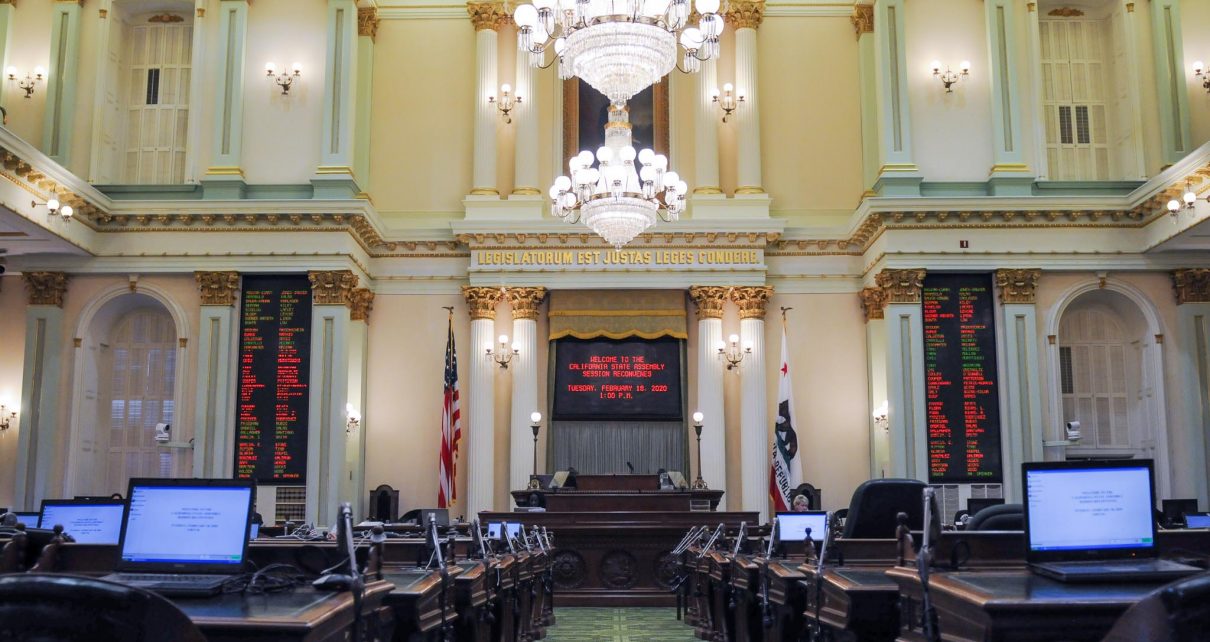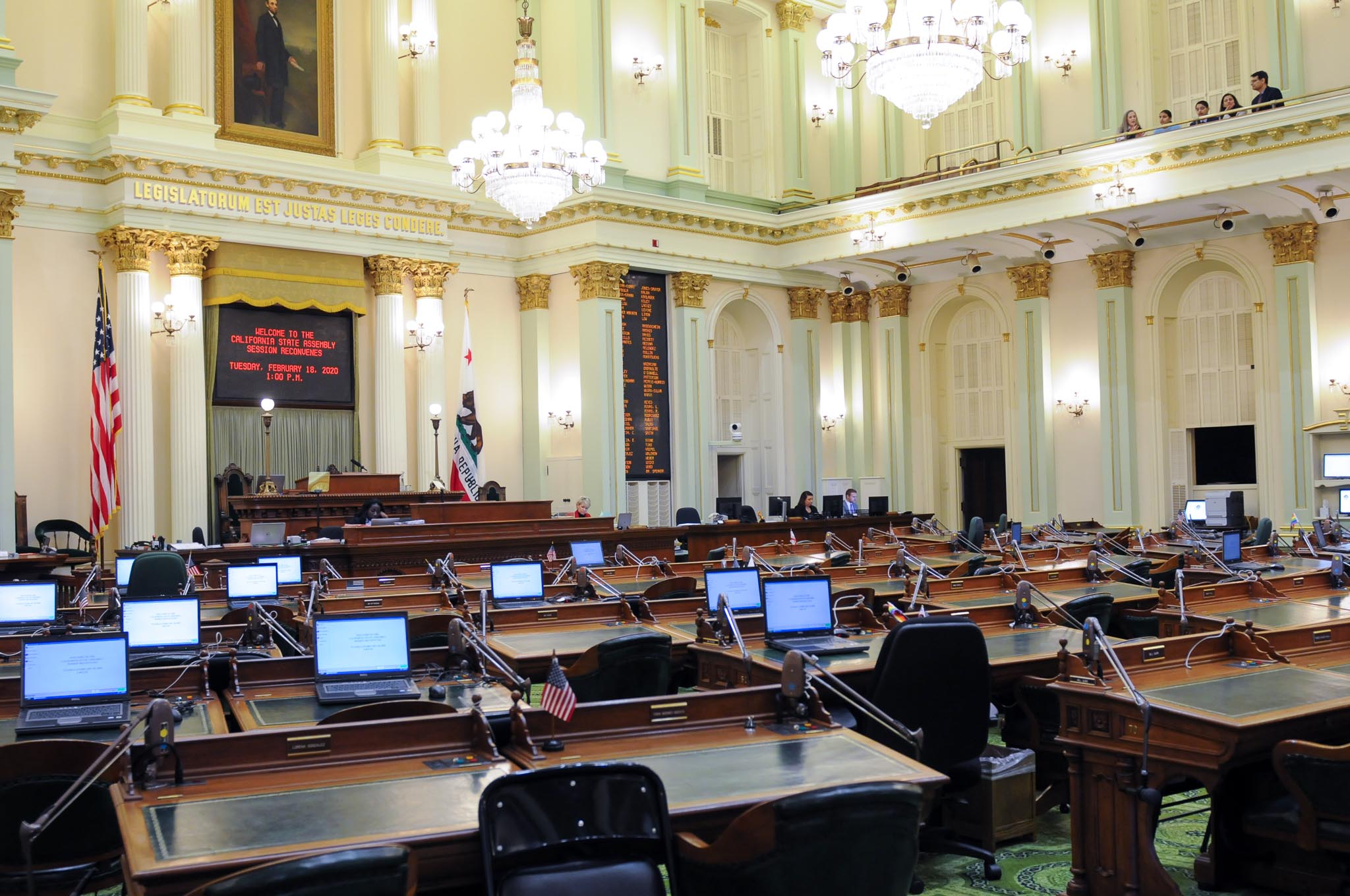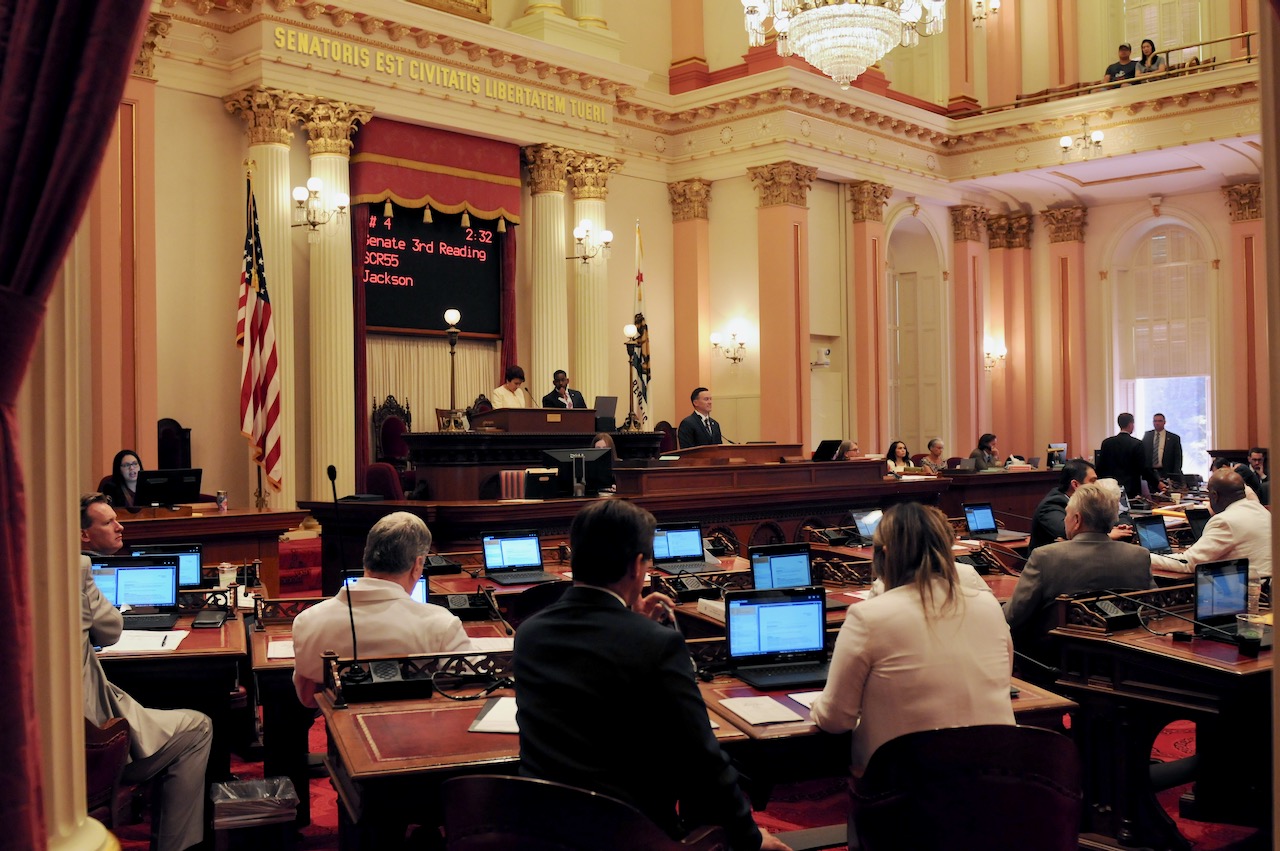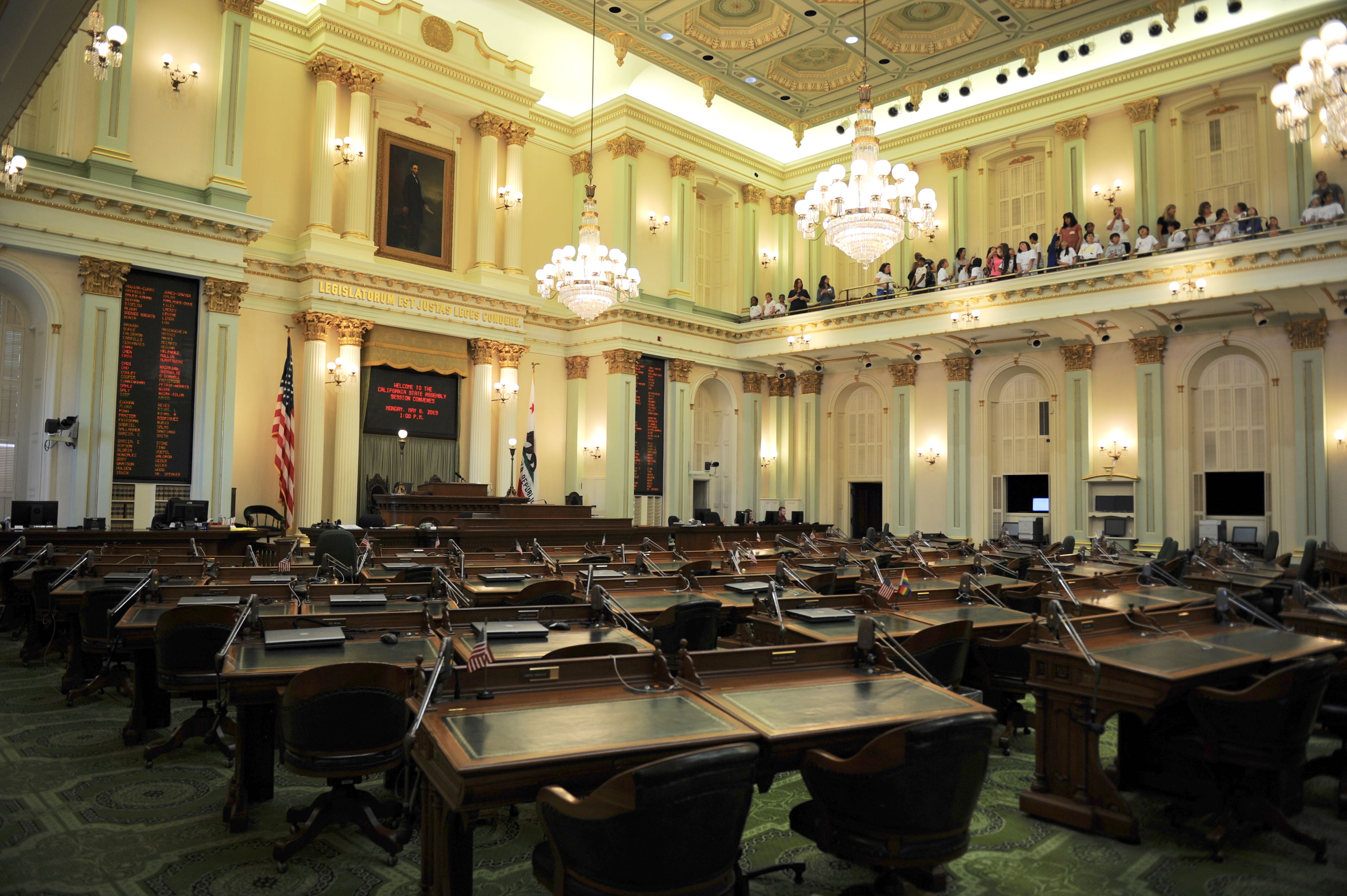
California State Assembly. (Photo: Kevin Sanders for California Globe)
Key Provisions of the Legislature’s Internal Rules – The Assembly Rules – Part I
By Chris Micheli, March 30, 2020 6:20 am
Beyond the relevant provisions of the California Constitution (contained primarily in Article IV), as well as applicable sections of the California Government Code, the State Senate and State Assembly are governed by their Joint Rules, the Standing Rules of the Senate and the Standing Rules of the Assembly. This article provides a summary of the Assembly Rules.
Assembly Rules
The following is a summary of the Assembly Rules with the corresponding rule number at the end of the explanatory sentence. Note that some Rule numbers do not exist.
The general officers of the Assembly are the Speaker, Speaker pro Tempore, Assistant Speaker pro Tempore, Majority Leader, Republican Leader, Chief Clerk, Sergeant at Arms, and Chaplain, and are elected by a majority of all Assembly Members. (Rule 1)
The Speaker determines the time for convening session. (Rule 2)
The Speaker shall call the Assembly to order at the appointed hour. (Rule 3)
Before business is conducted, the roll of the Members shall be called and the Presiding Officer must announce the names of those Members who will be absent that day and the reason for that. (Rule 4)
The person who was the Speaker when the previous regular session adjourned sine die shall be deemed to be the senior member elect, if he or she was re-elected to the Assembly. (Rule 5)
The adoption of the Standing Rules requires a majority vote of all Assembly Members and shall remain in effect unless suspended or amended. (Rule 6)
Rules may be temporarily suspended (but not beyond adjournment). (Rule 7)
A standing rule may not be amended except by a resolution adopted by a majority of the Assembly. (Rule 8)
In cases not provided in the constitution, statutes or rules, the authority shall be the latest edition of Mason’s Manual or the custom and usage of the Assembly. (Rule 10)
Thirty-two standing committees are created. (Rule 11)
All meetings of the Assembly or a committee shall be open and public. The Assembly or a committee may hold a closed session solely for any specified purpose in this rule. Political party caucuses may meet in closed session. (Rule 11.3)
A Member may not participate in a meeting of a conference committee considering any bill that is not open to the public. (Rule 11.4)
The standing committees (except Rules Committee) are investigating committees and are authorized to conduct oversight hearings and to study any subjects or matters which the Rules Committee may assign to them. (Rule 11.5)
The Speaker shall determine the size and appoint the members, chairs, and vice chairs of all standing committees and subcommittees, and shall consider the preferences of the Members. (Rule 12)
There is a Committee on Rules that acts as the executive committee of the Assembly. No Rules Committee member may serve as a standing committee chair at the same time. (Rule 13)
Within two days after the November general election, the caucus of both parties shall meet for the purpose of selecting their officers for the next session. (Rule 13.1)
The Rules Committee has specified powers, including bill referrals, appointing employees, adopting policies, contracting, etc. Rules Committee Chair appoints a Chief Administrative Officer of the Assembly, subject to ratification by the Rules Committee. (Rule 14)
The Subcommittee on Harassment, Discrimination and Retaliation Prevention and Response is created under the Rules Committee. It is composed of six members and shall review procedures for handling of complaints. (Rule 14.5)
The Rules Committee continues in existence during any recess and after final adjournment until the next regular session convenes and has the same powers as when the Assembly is in session. (Rule 15)
The Rules Committee annually prepares a report to the public of expenditures. (Rule 15.5)
The Rules Committee contracts for an independent audit of the revenues and expenditures for each fiscal year. (Rule 15.6)
The Rules Committee contracts for an audit of the administrative operations of the Assembly. All findings are made public and to the Members. (Rule 15.7)
The Rules Committee acting unanimously may extend congratulations, commendations, sympathy, or regret to any person, group or organization. (Rule 16)
The Rules Committee is the committee designated by the Government Code. The balance of monies is available to the Rules Committee for any charges or claims it may incur in carrying out its duties. (Rule 17)
A Member or committee may not incur any expense unless authorized. The Rules Committee provides for the manner of authorizing expenditures. Improvements to real or personal property shall be governed by competitive bidding. No out-of-state travel is reimbursed unless authorized. (Rule 18)
All claims for expenses by investigating committees are approved by the Rules Committee. Rules Committee decides rules governing the award of any contract by an investigating committee. (Rule 20)
Each witness summoned to appear before the Assembly or any committee shall be reimbursed at a rate set by the Rules Committee. (Rule 21)
The Assembly General Research Committee is continued as a permanent fact-finding committee pursuant to the Constitution. The committee is allocated all subjects within the scope of legislative regulation and control. The Speaker is the chair. (Rule 22)
The Assembly Legislative Ethics Committee is created. It consists of six Members appointed by the Speaker, three members from each of the two main parties. It details rules for dealing with complaints filed against a legislator. It may initiate an investigation of a Member. The complaint must be verified and in writing. A hearing can be held and evidence can be taken. Legal counsel is allowed. They can issue advisory opinions and must conduct an orientation course governing official conduct. They conduct lobbying ethics training and can impose fees on lobbyists for attending the course. (Rule 22.5)
All requests for the printing of reports of Assembly committees are referred to the Rules Committee. (Rule 23)
Every employee who works for a committee or Member or officer is an employee of the Assembly. They serve at the pleasure of the Assembly and can be terminated at will. All employees must complete the Assembly ethics course in the first six months of employment. Employees cannot engage in outside business activity that is inconsistent, incompatible or in conflict with his or her responsibilities as an employee of the Assembly. (Rule 24)
Accredited press representatives and the public shall not be excluded from any public legislative meeting or hearing and cannot be prohibited from taking photos or recording hearings. (Rule 25)
The Speaker possesses the powers and shall perform the duties set forth in this rule, such as to allocate funds, staffing and resources; appoint members of all committees; establish hearing schedules; and, have general control and direction of the official publications. (Rule 26)
The Speaker may designate any Members of the Assembly to attend funerals and other ceremonies and events. (Rule 27)
The Speaker appoints all non-elected officers of the Assembly, except the Republican Leader, who is elected by his or her caucus. (Rule 28)
The Speaker pro Tempore performs those duties assigned by the Speaker, including presiding over the Floor sessions. (Rule 29)
The Assistant Speaker pro Tempore performs those duties assigned by the Speaker or Speaker pro Tempore. (Rule 29.5)
It is the duty of the Majority Leader to make appropriate motions, points of order and other items necessary to expedite the proceedings of the Assembly. (Rule 30)
The chair of the majority and minority party caucuses perform those duties that are prescribed by their respective party caucuses. (Rule 31)
The Chief Clerk has specified duties, powers and responsibilities, such as keeping record of proceedings, supervising Assembly employees, acting as Parliamentarian, preparing all publications, assisting the Rules Committee with assignment of bills, etc. (Rule 32)
- Sources of Law - February 26, 2026
- Commercial Fishing - February 26, 2026
- Are These Extra Words Needed in California Statutes? - February 25, 2026




